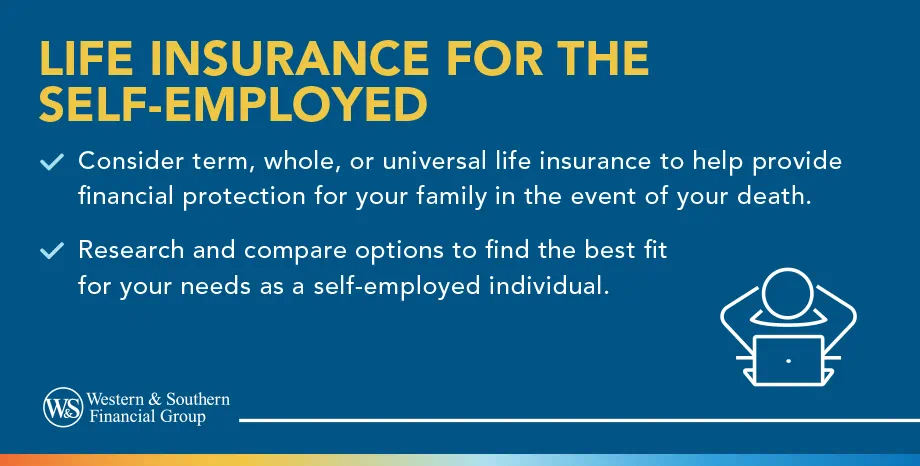

Key Takeaways
- Life insurance options for the self-employed include term, whole, and universal, each with unique benefits.
- Critical illness insurance can cover serious, life-threatening illnesses, complementing health insurance for self-employed individuals.
- Self-employed individuals should research and understand their insurance options to determine the best policies to fit their financial needs.
- Cash value accumulation, withdrawals, and loans from life insurance policies come with specific conditions and potential consequences.
Self-employment is becoming increasingly common. Being your own boss often comes with several perks — a flexible work schedule, the ability to work from anywhere and no cap on your earning potential. But for all the benefits, there are also a few caveats to manage that traditional employees may not encounter, such as paying self-employment taxes and purchasing your own insurance.
In a recent study, 46% of US workers have participated in freelance work in the past 12 months and will continue to grow in the upcoming years.1
And if you have your own business, it's not only health insurance you should be concerned about. Other insurance policies to consider include life insurance and critical illness insurance. If you're wondering where to start when it comes to insurance for the self-employed, here are a few policies to consider.
Life Insurance
Life insurance is an option to consider if your family would experience a financial hardship if something were to happen to you and they lost your income. There are three major types of life insurance to consider.
- Term life insurance provides coverage for a specified period that can be as short as five years or as long as 30 years. In many cases, you can renew the policy when it expires.
- Whole life insurance covers you for your entire life as long as premiums are paid. Although the primary benefit is the death benefit, whole life insurance can also build cash value that you could borrow against or withdraw.2 Doing so, however, could reduce the death benefit or cause the policy to lapse.
- Universal life insurance also covers you for your whole life as long as premiums are paid, but generally with more payment flexibility. When you first open the policy, your payments build up cash value. You then may have the flexibility to change how much you want to pay each year, and potentially use its cash value to help pay premiums as you age. Similar conditions to borrowing cash value from a whole life policy may apply. However, there may also be applicable surrender charges.
Critical Illness Insurance
In life, sometimes things happen when you least expect them. But that doesn't mean you can't try to be as prepared as possible. Critical illness insurance is one way you can prepare. This type of insurance helps provide coverage for some types of serious, life-threatening illnesses. The illnesses covered are defined by, and subject to the terms of, your policy.
Critical illness insurance does not replace the need for health insurance but may be a complement to health insurance if you're self-employed.
The policy pays you a cash benefit to help protect your quality of life with the freedom to use the money however you choose. You can use the money to help pay off debts, supplement lost income, arrange for child care while recovering, take a trip or simply maintain your quality of life.
The Bottom Line
Self-employment may come with many advantages, but stepping outside the bounds of traditional employment means you'll likely have to sort out a number of financial details for yourself, including health insurance, life insurance and other insurance policies.
Though paying for these costs out-of-pocket might seem negotiable, it's important to try to prepare for the unexpected. If you freelance or work for yourself, consider doing your research so you understand all your options and can then determine the best policy types to fit your financial needs.
Footnotes & Sources
- 40 Gig Economy Statistics You Must Learn: 2024 Market Share & Data Analysis. http://www.financesonline.com/gig-economy-statistics/.
- The policy would need to be funded properly to access the cash value. Keep in mind cash value may take years to accumulate, unless a large premium is paid up front. Withdrawals may be subject to charges, withdrawals of taxable amounts are subject to ordinary income tax, and, if taken before age 59½, may be subject to a 10% IRS penalty) and loans (e.g., interest is charged on loans, they may generate an income tax liability, reduce the Account Value and the Death Benefit, and may cause the policy to lapse. Please determine whether a withdrawal or loan is best for your situation.






























